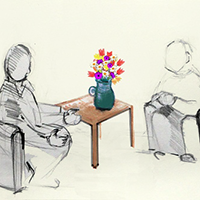Empathy as core to the development of holding and recognition: the case of Garret

Submitted: March 16, 2020
Accepted: June 13, 2020
Published: September 18, 2020
Accepted: June 13, 2020
Abstract Views: 1346
PDF: 665
HTML: 28
HTML: 28
Publisher's note
All claims expressed in this article are solely those of the authors and do not necessarily represent those of their affiliated organizations, or those of the publisher, the editors and the reviewers. Any product that may be evaluated in this article or claim that may be made by its manufacturer is not guaranteed or endorsed by the publisher.
All claims expressed in this article are solely those of the authors and do not necessarily represent those of their affiliated organizations, or those of the publisher, the editors and the reviewers. Any product that may be evaluated in this article or claim that may be made by its manufacturer is not guaranteed or endorsed by the publisher.
Similar Articles
- Bruno Faustino, António Branco Vasco, João Delgado, António Farinha-Fernandes, José Carlos Guerreiro, Exploring the impacts of COVID-19 related social distancing on loneliness, psychological needs and symptomatology , Research in Psychotherapy: Psychopathology, Process and Outcome: Vol. 23 No. 3 (2020)
- Joseph A. Hirsch, An American scientist's iconoclastic response to Psychotherapies for Anxiety and Depression: benefits and costs , Research in Psychotherapy: Psychopathology, Process and Outcome: Vol. 20 No. 2 (2017)
- Marta Vecchiato, Chiara Sacchi, Alessandra Simonelli, Nicola Purgato, Evaluating the efficacy of psychodynamic treatment on a single case of autism. A qualitative research , Research in Psychotherapy: Psychopathology, Process and Outcome: Vol. 19 No. 1 (2016): Special issue on Qualitative and Quantitative Research in Child and Adolescent Psychotherapy: part 2
- Ilaria Maria Antonietta Benzi, Nicola Carone, Laura Parolin, Gabriel Martin-Gagnon, Karin Ensink, Andrea Fontana, Different epistemic stances for different traumatic experiences: implications for mentalization , Research in Psychotherapy: Psychopathology, Process and Outcome: Vol. 26 No. 3 (2023)
- Vera Békés, Claire J. Starrs, J. Christopher Perry, Tracy A. Prout, Ciro Conversano, Mariagrazia Di Giuseppe, Defense mechanisms are associated with mental health symptoms across six countries , Research in Psychotherapy: Psychopathology, Process and Outcome: Vol. 26 No. 3 (2023)
- Sara Salzano, Isa Zappullo, Vincenzo Paolo Senese, Massimiliano Conson, Carmela Finelli, Mario Mikulincer, Phillip R. Shaver, Validation and psychometric properties of the Italian version of the Power Behavioural System Scale , Research in Psychotherapy: Psychopathology, Process and Outcome: Vol. 26 No. 1 (2023)
- Claudia Capella, Loreto Rodríguez, Estrella Azócar, Ximena Lama, Lucía Núñez, Daniela Águila, Camila Gomez, Macarena Espeleta, Vania Vasquez, Psychotherapeutic change in children and adolescents who have been sexually abused: a model from participants’ perspectives , Research in Psychotherapy: Psychopathology, Process and Outcome: Vol. 25 No. 1 (2022)
- Claudia Capella, Carolina Gutiérrez, Loreto Rodrìguez, Camila Gòmez, Change during psychotherapy: the perspective of children and adolescents who have been sexually abused , Research in Psychotherapy: Psychopathology, Process and Outcome: Vol. 21 No. 1 (2018)
- Marcia Olhaberry, Marìa José Leòn, Magdalena Seguel, Constanza Mena, Video-feedback intervention in mother-baby dyads with depressive symptomatology and relationship difficulties , Research in Psychotherapy: Psychopathology, Process and Outcome: Vol. 18 No. 2 (2015): Special issue on Qualitative and Quantitative Research in Child and Adolescent Psychotherapy: part 1
- Jeremy Jinkerson, Audrey Masilla, Raymond C. Hawkins, Can MBTI Dimensions Predict Therapy Outcome: Differences in the Thinking-Feeling Function Pair in CBT , Research in Psychotherapy: Psychopathology, Process and Outcome: Vol. 18 No. 1 (2015)
<< < 9 10 11 12 13 14 15 16 17 18 > >>
You may also start an advanced similarity search for this article.

 https://doi.org/10.4081/ripppo.2020.457
https://doi.org/10.4081/ripppo.2020.457




